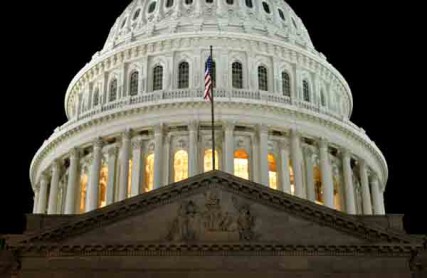
Three Buddhists, a Hindu and a “none” will walk into the 113th Congress, and it’s no joke. Rather, it’s a series of “firsts” that reflect the growing religious diversity of the country.
When the new Congress is sworn in next January, Hawaii Democrat Tulsi Gabbard, an Iraq war veteran, will represent the state’s 2nd Congressional District and will become the first Hindu in either chamber on Capitol Hill.
The 31-year-old Gabbard was born in American Samoa to a Catholic father and a Hindu mother, and moved to Hawaii as a child. She follows the Vaishnava branch of Hinduism, which venerates the deity Lord Vishnu and his primary incarnations.
Gabbard takes over the seat held by Rep. Mazie K. Hirono, who won a Senate race on Nov. 6 and will become the first Buddhist to sit in the upper chamber. There were already two other Buddhists in the House of Representatives, both of whom won re-election: Rep. Hank Johnson, a Georgia Democrat, and Rep. Colleen Hanabusa, a fellow Hawaii Democrat.
An analysis of the incoming Congress by the Pew Forum on Religion & Public Life also notes that Kyrsten Sinema, and Arizona Democrat who narrowly won a seat in the House, is the first member of Congress to publicly describe her religion as “none” – the popular name of a fast-growing category of Americans who say they have no particular religious affiliation.
After Sinema's win was heralded by nontheist groups, her campaign said she does not consider herself an atheist but rather “secular.”
The Pew Forum – which based its congressional analysis on data collected by CQ Roll Call – says that about one in five U.S. adults describe themselves as atheist, agnostic or “nothing in particular.” Ten other members of the 113th Congress (about 2 percent) do not specify a religious affiliation, Pew says, up from six members in the outgoing 112th Congress.
The next Congress will also see significant shifts among the mainstays of the American religious landscape.
Protestants will still comprise the majority, with about 56 percent of the members in both chambers. But that continues a steady decline since 1961, when 75 percent of members were some variety of Protestant.
Jews in Congress will see a decline, going from 39 seats to 32 seats – though at 6 percent that is still a significantly larger share than their proportion in the overall U.S. population, which is just under 2 percent. And even though Mitt Romney, the Mormon standard-bearer, lost the presidential election, the number of Mormons in Congress remains the same, at about 3 percent, or 15 seats overall.
Roman Catholics appear to be the big winner from the Nov. 6 vote, edging up from about 156 seats, or 29 percent of Congress, to 161, or just over 30 percent. That compares with the 22 percent of the wider U.S. population that identifies as Catholic. Catholic Democrats outnumber Catholic Republicans in the House by a 73-61 margin, and by an 18-9 margin in the Senate.
Two Muslim members of the House — Minnesota's Keith Ellison and Indiana's Andre Carson, both Democrats — will return to Capitol Hill in January.






